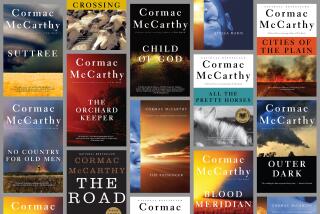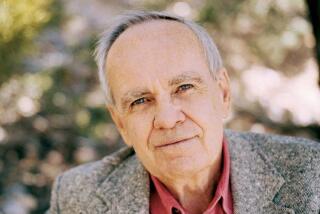Conrad’s ‘Nostromo’
- Share via
Whereas most of Joseph Conrad’s fictions grew directly out of stories he had heard of from his own experiences, providing him with a ready-made cast of characters to remold and a plot to reshape if he wished, “Nostromo” (1904) was based on a “vagrant anecdote completely destitute of valuable details” that he claimed to have heard in the Gulf of Mexico during 1876-1877 on one of his rare visits to those waters.
In the course of a South American revolution, a boat loaded with silver had been stolen single-handed and disappeared. In addition to his brief views of Venezuela and Colombia, Conrad drew on the coast of Chile, the Gulf of Panama and the Mexican seaboard as far north as Mazatlan for the physical creation of his imagined Latin American state, “Costaguana.”
In one sense, this lack of “valuable details” gave him unlimited freedom of invention as he worked out the destiny of Costaguana and its corrupt government. But it also made him uneasy, as he was to write to his aristocratic Scots friend Cunningham Graham, who had at age 17 gone to ranch in Argentina, spending the next 13 years of his life in the Americas.
This flamboyant claimant to the Scottish throne, a Socialist Member of Parliament, probably gave his aristocratic Polish friend some advice on pertinent reading. Conrad was to use him for the model of Don Carlos Gould, an Englishman who had developed a valuable silver mine in Costaguana, only to meet his death through it.
In spite of Don Carlos’ warning to his son not to return to Costaguana, the idealistic Charles Gould is determined to go back with his English bride, Emilia, and use his wealth for the redemption of the land and the service of its repressed masses whose only trust is given to one of their own, Nostromo.
Conrad had no problems in creating his scenes of violent strife, revolution and counterrevolution. He had only to transplant the history of his beloved Poland, where his own father had taken part in an unsuccessful insurrection against Russian oppression, to Latin American soil, where it took root and flourished in his imagination. And with it came an enormous cast of characters representing the decaying aristocracy, the ruthless tyrant, the failed idealist.
Already an enemy of colonialism and imperial exploitation, Conrad saw the disastrous potential of American interference and dominance as represented by the invisible financier Holroyd--on whom Gould comes to depend--making decisions in his San Francisco office. With all its turn-of-the-century elaborateness of manner and leisurely development, “Nostromo” makes thoroughly contemporary, embarrassingly pertinent listening.
But if Conrad had no lack of moral and political material for fleshing out his imagined country, he had his usual problems of writing, sitting paralyzed for hours at a time staring at a half-filled page, depressed not only mentally but physically, because he loathed dentists and called on them only as a last resort.
As documented by Conrad himself, the last hours of completing the novel’s first draft approach the grotesque: “And all the time horrible toothache. On the 27th, had to wire for dentist (couldn’t leave the work), who came at 2 and dragged at the infernal thing which seemed rooted in my very soul. The horror came away at last, leaving however one root in the gum. Then he grubbed for that till I leapt out of the chair.” After the dentist relented, Conrad continued work until “At 11:30 I broke down . . . Then I don’t know: two blank hours during which I must have got out and sat down (not fallen) on the concrete outside the door. That’s how I found myself; and crawling in again noted the time: considerably after one.”
Normally, one might wish to hear an author read his own work, or at least a sample of it, but apparently no recording of Conrad’s voice exists. This is probably fortunate, for all his friends commented on this master of English prose’s eccentric pronunciation and accent, derived in part from the shipboard, partly Cockney, speech he picked up from the British sailors he so much admired. He never mastered the sound of “th,” which he rendered as “d,” and his latest biographer states: “ ‘Iodine’ he pronounced ‘uredyne,’ which his young son once took to mean ‘you are dying.’ ”
Luckily for us, Wolfram Kandinsky’s interpretation of Conrad’s frequently convoluted language with its vividly portrayed landscapes is exemplary, even dedicated. In addition to “Nostromo” he has recorded 12 other Conrad titles.
WHERE TO ORDER TAPES: Books on Tape, Inc. P.O. Box 7900, Newport Beach, CA 92658. For either purchase or rental call 1--800--626-3333.
More to Read
Sign up for our Book Club newsletter
Get the latest news, events and more from the Los Angeles Times Book Club, and help us get L.A. reading and talking.
You may occasionally receive promotional content from the Los Angeles Times.










